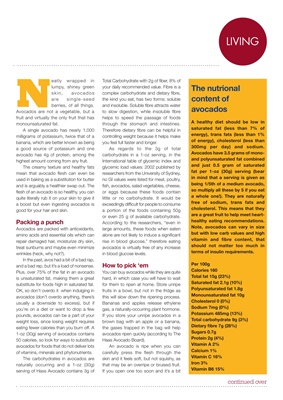
LIVING
N
eatly wrapped in
lumpy, shiney green
skin, avocados
are single-seed
berries, of all things.
Avocados are not a vegetable, but a
fruit and virtually the only fruit that has
monounsaturated fat.
A single avocado has nearly 1,000
milligrams of potassium, twice that of a
banana, which are better known as being
a good source of potassium and one
avocado has 4g of protein, among the
highest amount coming from any fruit.
The creamy texture and healthy fats
mean that avocado flesh can even be
used in baking as a substitution for butter
and is arguably a healthier swap out. The
flesh of an avocado is so healthy, you can
quite literally rub it on your skin to give it
a boost but even ingesting avocados is
good for your hair and skin.
Packing a punch
Avocados are packed with antioxidants,
amino acids and essential oils which can
repair damaged hair, moisturize dry skin,
treat sunburns and maybe even minimize
wrinkles (heck, why not?).
In the past, avos had a bit of a bad rap,
and a bad rep, but it's a load of nonsense.
Plus, over 75% of the fat in an avocado
is unsaturated fat, making them a great
substitute for foods high in saturated fat.
OK, so don't overdo it when indulging in
avocados (don't overdo anything, there's
usually a downside to excess), but if
you're on a diet or want to drop a few
pounds, avocados can be a part of your
weight loss, since losing weight requires
eating fewer calories than you burn off. A
1-oz (30g) serving of avocados contains
50 calories, so look for ways to substitute
avocados for foods that do not deliver lots
of vitamins, minerals and phytonutrients.
The carbohydrates in avocados are
naturally occurring and a 1-oz (30g)
serving of Hass Avocado contains 3g of
continued over
A healthy diet should be low in
saturated fat (less than 7% of
energy), trans fats (less than 1%
of energy), cholesterol (less than
300mg per day) and sodium.
Avocados have 3.5 grams of mono-
and polyunsaturated fat combined
and just 0.5 gram of saturated
fat per 1-oz (30g) serving (bear
in mind that a serving is given as
being 1/5th of a medium avocado,
so multiply all these by 5 if you eat
a whole one!). They are naturally
free of sodium, trans fats and
cholesterol. This means that they
are a great fruit to help meet hearthealthy eating recommendations.
Note, avocados can vary in size
but with low carb values and high
vitamin and fibre content, that
should not matter too much in
terms of insulin requirements.
Per 100g
Calories 160
Total fat 15g (23%)
Saturated fat 2.1g (10%)
Polyunsaturated fat 1.8g
Monounsaturated fat 10g
Cholesterol 0 (0%)
Sodium 7mg (0%)
Potassium 485mg (13%)
Total carbohydrate 9g (3%)
Dietary fibre 7g (28%)
Sugars 0.7g
Protein 2g (4%)
Vitamin A 2%
Calcium 1%
Vitamin C 16%
Iron 3%
Vitamin B6 15%
The nutrional
content of
avocados
Total Carbohydrate with 2g of fiber, 8% of
your daily recommended value. Fibre is a
complex carbohydrate and dietary fibre,
the kind you eat, has two forms: soluble
and insoluble. Soluble fibre attracts water
to slow digestion, while insoluble fibre
helps to speed the passage of foods
through the stomach and intestines.
Therefore dietary fibre can be helpful in
controlling weight because it helps make
you feel full faster and longer.
As regards to the 3g of total
carbohydrate in a 1-oz serving, in the
International table of glycemic index and
glycemic load values: 2002 published by
researchers from the University of Sydney,
no GI values were listed for meat, poultry,
fish, avocados, salad vegetables, cheese,
or eggs because these foods contain
little or no carbohydrate. It would be
exceedingly difficult for people to consume
a portion of the foods containing 50g
or even 25 g of available carbohydrate.
According to the researchers, "even in
large amounts, these foods when eaten
alone are not likely to induce a significant
rise in blood glucose," therefore eating
avocados is virtually free of any increase
in blood glucose levels.
How to pick 'em
You can buy avocados while they are quite
hard, in which case you will have to wait
for them to ripen at home. Store unripe
fruits in a bowl, but not in the fridge as
this will slow down the ripening process.
Bananas and apples release ethylene
gas, a naturally-occurring plant hormone.
If you store your unripe avocados in a
brown bag with an apple or a banana,
the gases trapped in the bag will help
avocados ripen quickly (according to The
Haas Avocado Board).
An avocado is ripe when you can
carefully press the flesh through the
skin and it feels soft, but not squishy, as
that may be an overripe or bruised fruit.
If you open one too soon and it's a bit